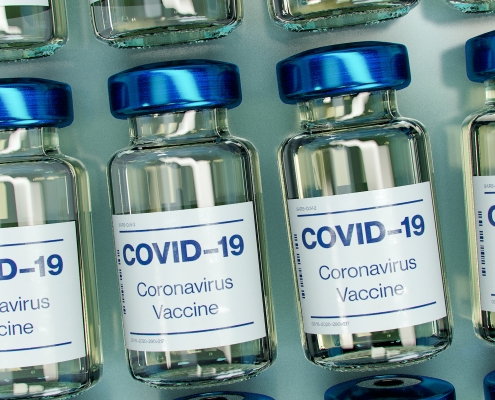 On December 18, 2020, the FDA issued an Emergency Use Authorization (EUA) letter to ModernaTX, Inc. for emergency use of the Moderna COVID-19 Vaccine. On December 23, 2020, Pfizer, Inc. received an EUA for emergency use of the Pfizer-BioN’Tech COVID-19 Vaccine. Both the Moderna and the Pfizer vaccine require two doses. Since that time, over 27 million Americans have received their first dose, and more than 6 million have been fully vaccinated.
On December 18, 2020, the FDA issued an Emergency Use Authorization (EUA) letter to ModernaTX, Inc. for emergency use of the Moderna COVID-19 Vaccine. On December 23, 2020, Pfizer, Inc. received an EUA for emergency use of the Pfizer-BioN’Tech COVID-19 Vaccine. Both the Moderna and the Pfizer vaccine require two doses. Since that time, over 27 million Americans have received their first dose, and more than 6 million have been fully vaccinated.
As vaccination numbers increase, employers are now considering a physical return to the workplace. In doing this, employers are faced with issues regarding their COVID-19 policies, including policies relating to employee vaccinations, and whether they can, or should, make vaccinations a requirement.
Before doing so, employers should understand the current state of the vaccines that are available as well as understand the potential legal and liability ramifications of having a mandatory policy.
What is an EUA?
- An EUA permits the use of unapproved medical products, like the COVID-19 vaccine, to treat or prevent serious diseases or conditions caused by biological agents if certain criteria set forth by federal statute are met. These vaccines are continuing the process to be fully approved by the FDA.
- Under the EUA, the vaccines are only available for emergency use under strict requirements and guidelines as provided in the EUA themselves and the Fact Sheets.
- The Fact Sheets for Healthcare Providers Administering the Vaccine for both the Pfizer and Modern Vaccine require that certain information be provided to the Vaccine Recipients which include informing the recipient that they have “the option to accept or refuse” the vaccine.
Can employers legally implement mandatory COVID-19 vaccination policies?
- Possibly. On December 16, 2020, the Equal Employment Opportunity Commission (EEOC) updated its Technical Assistance Questions and Answers publication. Although the EEOC did not specifically address whether employers could adopt mandatory vaccination policies, through its responses, it strongly suggested that, with certain exceptions, employers may require vaccinations “when they are available.”
- These updated Technical Assistance Questions and Answers are merely guidance from the EEOC in relation to whether mandatory vaccination policies are permissible under the Americans With Disability Act (ADA), Title VII and the Genetic Information Discrimination Act (GINA). Federal courts are not bound by this guidance and it does not address these same issues under applicable state law, which could have more stringent requirements related to employer mandated vaccination policies. Any employer wishing to adopt a mandatory COVID-19 policy for all employees should consult with counsel regarding the potential impact of applicable state and local law.
What is the EEOC guidance in relation to COVID-19 vaccinations and mandatory policies?
- Prior to COVID-19, the EEOC suggested that, generally, ADA-covered employers should encourage employees to get vaccinated for the flu, but that they shouldn’t mandate it. Through its recent guidance, the EEOC has stated that a mandatory vaccination policy as a condition of working onsite may be lawful under the ADA and Title VII, but employers must provide reasonable accommodations related to disabilities or sincerely held religious beliefs, practices or observances.
- The EEOC differentiated between employers who would be mandating the vaccine and administering the vaccine either themselves or through a contracted third party from those employers that just mandated that all employees be vaccinated prior to returning to the workplace.
- The EEOC has held that the administration of the vaccine by the employer is not, in and of itself, a medical examination. However, prescreening questions to determine if someone should receive the vaccine would be a medical examination or disability inquiry that could possibly be in violation of the ADA or the GINA.
- Employers that offer voluntary administration or where the employee obtains the vaccine from an unrelated third party like their own physician or a pharmacy which would not require the employer to prescreen can avoid this pitfall.
Can an employee refuse to be vaccinated?
- Because the current vaccines are currently available only under the EUAs, employers administering the vaccination themselves are required to inform recipients that they can refuse the vaccination. In fact, in its guidance, the EEOC specifically quotes from the EUA that recipients receive the information regarding the recipient’s option to accept or refuse the vaccine. The EEOC does not comment further on how this requirement under the EUA affects an employer’s ability to mandate the vaccine, if at all.
- Refusal under the ADA (Disability). If an employee states that they are unable to receive the vaccination due to a “disability,” the employer is required to go through the interactive process to determine whether there is a reasonable accommodation that does not pose an under hardship on the employer.
- An undue hardship analysis under ADA is fact specific, but in general means that the employer would suffer a significant difficulty or expense if required to provide an accommodation.
- Before an employer excludes unvaccinated employees from workplace, the employer must engage in the interactive process and demonstrate that the employee will expose others to the virus and no reasonable accommodation exists that would eliminate or reduce the risk of the employee posing a direct threat to fellow employees.
- Refusal under Title VII (religion). If an employee refuses to be vaccinated based on a sincerely held religious belief, practice or observance, the EEOC states that the employer should assume that the request for a religious accommodation is based upon a sincerely held belief, unless the employer has an objective basis for questioning either the religious nature or the sincerity, in which case the employer may be justified in requesting additional supportive information.
- In relation to an employee who refuses on religious grounds, providing a reasonable accommodation without undue hardship means an accommodation that has more than a de minimis cost or burden on the employer.
- Employers should have a plan in place to address issues surrounding an employee’s refusal to be vaccinated, whether on protected grounds or not.
Are there liability issues that an employer should consider before mandating its employees receive a COVID-19 vaccination?
- Similar to any case involving the ADA or Title VII, an employer can be liable to an employee for its failure or refusal to provide a reasonable accommodation where an employer cannot show undue hardship or a direct threat.
- Employers can also face liability for retaliation if it takes adverse employment action because of the requested accommodation.
- For employers who elect to administer the vaccine, the Public Readiness and Emergency Preparedness (“PREP”) Act may provide some immunity from liability, except for willful misconduct, “for loss caused, arising out of, relating to, or resulting from administration or use of countermeasures to diseases, threats and conditions” and “to entities and individuals involved in the development, manufacture, testing, distribution, administration, and use of such countermeasures.”
- The U.S. Department of Health and Human Services (HHS) has stated that “Covered Persons” for purposes of immunity from liability may include manufacturers, distributors, and program planners. The HHS provided examples of program planners to include private sector employers who supervise or administer a program with respect to the administration, dispensing, distribution, provision or use” of the vaccine or who “provide a facility to administer” the vaccine.
- Worker’s Compensation. Generally, an employee must prove injury arising out of and in the course of employment. For injury (like an adverse reaction to vaccine) related to the receipt of a vaccine, the issue is whether the vaccine was given in the course of employment. If the vaccine was received under a mandatory program, it is likely that it would be covered by worker’s compensation. If the employer has a voluntary program, several factors would likely be considered including whether the vaccination was within the terms and conditions of employment and whether it occurred on the company’s premises.
- National Labor Relations Act. In a unionized setting, absent legal mandate, mandatory vaccination policies would likely be considered a mandatory subject of bargaining. In a nonunionized setting, Section 7 of the NLRA grants employees right to engage in “concerted activities” for the purposes of “mutual aid and protection”. Where employees act in concert to protest a mandatory policy in communications, taking adverse employment action against those employees could run afoul of the NLRA.
- Occupational Safety and Health Act. Currently, there is no standard relating to COVID-19 vaccinations, but employers are required to provide a workplace free from recognized hazards that are likely to cause serious harm or death. Employees may be able to refuse vaccinations under the OSH Act if the individual employee has a “reasonable belief” that the vaccine is unsafe. Terminating the employment of such an employee could result in liability under a retaliation claim.
- Fair Labor Standards Act. Issues may arise under the FLSA where the employer is requiring employees to be vaccinated but is not administering the vaccinations. These issues include whether the waiting time and/or travel time to and from the place of vaccination is compensable as hours worked.
Can an employer that is not mandating vaccination offer incentives to employees for getting vaccinated?
- The EEOC has issued a proposed regulation that would require any incentive to be de minimis. It is not final and there is uncertainty how the courts would interpret and apply it.
- Some incentives that may be considered are de minimis gifts for employees who provide proof of vaccination; additional PTO for employees to get the vaccine and possibly to recover from an adverse reaction; or providing for voluntary vaccination programs at the worksite.
- In order to maintain voluntary status, any cash or gift must be limited in value.
- An Employer must provide a reasonable accommodation to those who are unable to be vaccinated due to a disability providing equal benefits and privileges of employment.
- If an employer is providing the vaccine, Wellness Program restrictions and regulations may apply.
C. Douglas Moran | Employment, Complex Commercial Litigation, Real Estate Litigation and Bankruptcy Litigation
Doug concentrates his practice in representing employers, corporations and banks in litigation, including complex litigation. Doug has represented employers, banks and companies ranging from single member LLCs and closely-held corporations up to Fortune 500 companies, contact Doug.


